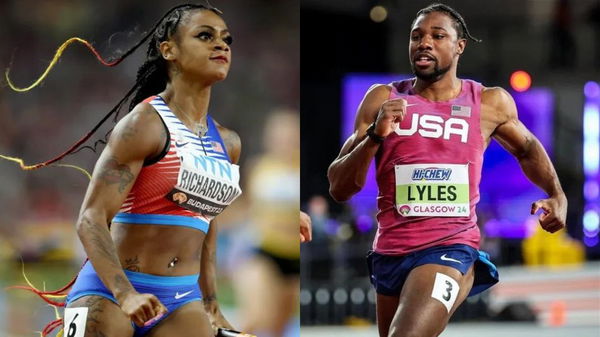
via Imago
Sha’Carri Richardson, Noah Lyles Image credits: Imago

via Imago
Sha’Carri Richardson, Noah Lyles Image credits: Imago
This year, the topic that remains consistently hot is prize money, and it’s still dominating conversations today. With all these inequality debates swirling around, Michael Johnson seems to be on a roll. Most recently, the American track legend will be launching the Grand Slam Track League, a lucrative new athletics venture that is being likened to the Diamond League. And why? Prize money, of course. This initiative aims to bring together the world’s top runners including athletes like Sha’Carri Richardson, Noah Lyles, Christian Coleman, and more, by offering an enticing top prize of $100,000. Set to commence in April 2025, the league will hold four events each year, offering a total prize pool of $12.6 million.
It seems this league now does justice to track stars like Noah Lyles, who has been vociferous in his stances about the sorry plight of the track. He even referred to it as a “dying sport”. Even Sha’Carri Richardson withdrew from Miramar this year, possibly due to prize money concerns. However, as this league gains momentum, comparisons to the Diamond League reveal stark differences, highlighting the significant strides being made.
In the Diamond League, competitors can range from $10,000 for 1st place winner to $500 for finishing eighth in the series event. The stakes are even higher in the race, with the champion earning $30,000 and the second-place finisher taking home $12,000. The prize money drops to $1,000 for a place in the final. On the other hand, the Grand Slam Track League, though new offers significantly larger rewards. This noticeable contrast underscores the struggle for backing, in athletics.
ADVERTISEMENT
Article continues below this ad

Two of these events will take place in the United States, providing a competitive platform for 48 contracted athletes, each competing in two events over the course of each three-day event. Another group of 48 “challengers” will receive appearance fees. The league assures adherence to World Athletics regulations, allowing athletes to earn ranking points.
With $30 million in commitments from investors, including Johnson’s partner Winners Alliance, the Grand Slam Track League seeks to revolutionize athletics at a juncture where sovereign wealth funds, private equity, and billionaires are funneling investments into sports to capture fans’ attention. Winners Alliance, supported by hedge fund billionaire Bill Ackman, stands as a prominent force in this endeavor. However, the financial landscape of athletics has become a significant topic of discussion in recent months.
ADVERTISEMENT
Article continues below this ad
After Michael Johnson’s move, is the Athletic World finally addressing the compensation gap?
In April 2024, World Athletics unveiled plans to allocate $2.4 million for compensating gold medalists at the Paris Olympics, with each recipient receiving $50,000. This inclusive approach extends to relay teams, who will equally share the reward. Despite this positive change, prominent athlete Noah Lyles expressed criticism, stating, “There are so many new developments in the world of track and only one of them seems positive to me.”
Lyles’ words shared broader discontent within the athletics community. Athletes like Sha’Carri Richardson and Kyree King have highlighted ongoing disparities and financial challenges within the sport. Richardson’s withdrawal from the Miramar Invitational and King’s experience with non-payment after a 2022 win highlights the complexities athletes face beyond the competition. But this doesn’t end here.
ADVERTISEMENT
Article continues below this ad
Kenny Bednarek emphasizes the financial strains involved in elite-level participation. “The cost to fly and accommodate my team at the trials and Olympics is pretty wild. Prices are jacked up,” Bednarek explained. Lyles empathized, noting, “It’s hard for all of us, man,” stressing the importance of a supportive community. Bednarek reinforced this sentiment, highlighting, “It’s crazy because that’s when we need our entire support system the most.”
Earlier this month, World Athletics revealed their plans, for a global championship scheduled to start in 2026 offering gold medalists a prize of $150,000. The championship boasts a prize fund of $10 million aiming to increase the rewards for athletes. Michael Johnson has voiced his support for this initiative, highlighting the importance of ensuring compensation for athletes who put themselves at risk to compete against the world’s performers. This shift marks a departure from the system where athletes often did not receive recognition for their hard work and sacrifices.
ADVERTISEMENT
ADVERTISEMENT
ADVERTISEMENT
ADVERTISEMENT

